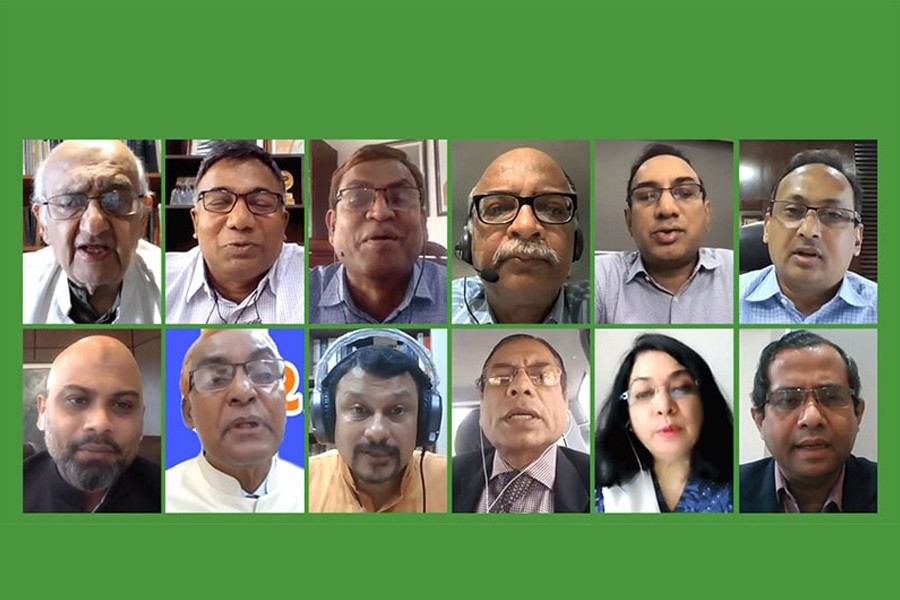The government has been urged to immediately discontinue the 'special energy law' for ensuring transparency and good governance in the power and energy sector.
Speakers at a dialogue on Sunday argued that the 'Speedy Supply of Power and Energy (Special Provision) Act-2010' should be discontinued to make the sector competitive.
"… all types of bidding should be held under an open bidding system maintaining transparency. That is why the act should be discontinued," CPD Research Director Dr Khondaker Golam Moazzem said while presenting a keynote paper.
The Centre for Policy Dialogue (CPD) organised the virtual dialogue on "The Power Sector in the National Budget for FY2022: Perspectives on Allocative Priorities & Reform Agenda".
The government had enacted the law on October 12, 2010, for only two years. Later, it was extended four times and the tenure is going to be ended in October this year.
Dr Moazzem expressed the fear that if the act continues further, it would create more corruption, reduce the scope of competition, and increase non-transparency in the project implementation process.
The large parts are 'carryover' projects in the power sector, requiring quick implementation, highlighted the keynote paper.
"The budget allocation for renewable energy-related projects should be further enhanced and activities of the Sustainable & Renewable Energy Development Authority (SREDA) should be further promoted," it said.
The CPD thinks that, it noted, the government should invest more in renewable energy (RE) based projects (both small and large scale ones).
It said the foreign direct investment (FDI)should be facilitated in the renewable energy sector by making the domestic business environment favorable, including making the businesses viable and de-risking.
However, the CPD said that the success of the power sector needed a new narrative which should focus on efficiency, better pricing, low carbon power generation, and improvement of transmission and distribution.
CPD Distinguished Fellow Professor Mustafizur Rahman stated that in view of the government's recent commitment for developing a clean energy-based power sector, a lot of attention has been created about how the proposed budget is planned to shift its focus and allocation both towards reduction of fossil-fuel-based power generation and enhancement of renewable energy-based power generation.
CPD Research Director Dr Khondaker Golam Moazzem also pointed out three contradictory issues in official data - overcapacity, frequent power outage, and 'zero' load-shedding -that have been continuing in the country simultaneously.
The Bangladesh Power Development Board (BPDB)has been bearing a huge financial burden because of its overcapacity in power generation," he said.
Taking part in the discussion, Director General of the Power Cell Mohammad Hossain said the government is committed to reduce carbon emission and there are efforts to phase out the coal energy while the quick rental power plants will be gradually phased out.
Chairman (Additional Secretary) of SREDA Mohammad Alauddin said that there is a need to look for renewable energy beyond solar and wind which required more research.
CPD Chairman Professor Rehman Sobhan raised a question why many of the power plants were still operating despite those should have been retired by now.
He also stressed the need for identifying that how much of the excess capacity could be attributed to distribution failure.
The excess capacity of energy generation exists in paper only and not in reality, said Dr M Tamim, former Special Assistant to the Chief Advisor of the caretaker government, and Professor of the Department of Petroleum and Mineral Resources Engineering, Bangladesh University of Engineering and Technology (BUET).
He recommended analysing the sector by looking beyond the budget and considering the real scenario.
Agreeing with Dr Tamim, Mr Imran Karim, President of Bangladesh Independent Power Producers' Association (BIPPA), recommended that Bangladesh should have the capacity to toggle between various fuels to reduce the energy generation cost.
Director of Bangladesh Garment Manufacturers and Exporters Association (BGMEA) and Managing Director of Urmi Group Asif Ashraf called for providing tax incentives to the businesses that generate solar energy.
Executive Director and CEO of Infrastructure Development Company Limited (IDCOL) Mahmood Malik opined that rooftop solar energy can be a good source of renewable energy in Bangladesh which can be used beyond industrial purpose.
President of Solar Mini-Grid Association Engr. DM Majibor Rahman proposed to form a core committee of engineers for research and analysis to develop efficient generation system of solar energy.
Dr Farseem Mannan Mohammedy, Director of Centre for Energy Studies, Bangladesh University of Engineering and Technology (BUET), said the inter-agency coordination is highly important with a view to ensure efficient power distribution at different district and upazilla levels.
The national budget for FY2022 is a business-as-usual case and no special initiative was taken into consideration for the power and energy sector, he said.
In her closing remarks, Executive Director of CPD Dr Fahmida Khatun, who chaired the event, stressed the need for ensuring quality supply of energy.
The dialogue was also attended by high-level policymakers, political leaders, academics, development practitioners, business leaders, civil society activists, international development partners and journalists, among others.


